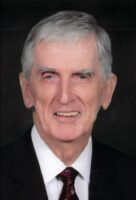
Spotlight on Community College Leaders: Piedmont Community College Trustee James Woody
By Ashley Blizzard, NCACCP/NCACCT Communication Coordinator & Events Manager
James Woody, trustee at Piedmont Community College (PCC), has simple, but sound advice for new trustees: 1) Get to know your fellow board members; 2) Work together for what is best for the students; 3) Support the college by participating in school and foundation-sponsored events; and 4) Be involved in the community.
Woody has been a trustee for five years and has been on PCC’s foundation board for 30 years. His interest in community colleges began when he became an adjunct professor for Durham Technical Community College in the 60s; he taught blueprint reading in the evenings. At that same time, he was teaching drafting and basic electricity in the public school system. However, he later left the teaching profession and moved into the construction business.
The dedicated professors at the community colleges have been an inspiration to Woody. He says he appreciates seeing “people give so much of their lives to their local schools.”
Concerns Woody has right now for the North Carolina Community Colleges are the need for salary increases for our instructors and staff and being able to continue to offer first-class programs with limited face-to-face contact due to Covid-19. He stated there are certain areas of instruction that need practical, face-to-face experience like nursing, welding and construction; those are difficult to do online.
The community college is important to Woody because of Dallas Herring’s statement about how we “take people from where they are to where they want to go.” Woody states that community colleges offer a wide range of educational opportunities—from obtaining GEDs to associate’s degrees to moving onto universities. “Today’s time is different from so many years ago,” says Woody. “A person needs more than just a high school education. You can’t do it unless you have the training and education. We are here to offer them those services,” says Woody.
Woody is most proud of how his community respects PCC and the fact that PCC is so adaptable. “People in the two counties we serve realize they have a gem in this school,” says Woody. He is also proud of how quickly the college adapts to changing needs. When a new industry comes into the area, he appreciates how the college finds out what type of education that industry requires and then has the people who can serve those educational needs. He says PCC’s ability to adjust to shifting demands is “exemplary,” especially during the pandemic.
Two advancements Woody would like to see at PCC are first, an increase in salary for their employees. Second, he stated that as a low-income area with limited access to funds, his school has a difficult time raising money to build new buildings or to even maintain existing facilities. He would like for that to change.
When he is not participating in school or community activities, Mr. Woody may be found at home working in his yard or tinkering with his (rather large) model train. (It is approximately 26 feet wide by 18 feet long.) He and his wife also enjoy spending time at their condominium in North Myrtle Beach. As president of the Homeowners’ Association there, he utilizes his construction background to assist with some of the construction the condominiums are going through now.
A time in his life he would love to repeat was when he was on the State Board and was selected to be a part of a study group that was studying the government-run community college system in Thailand. Woody said he enjoyed traveling the country, observing the people and wildlife, observing the different cultures, and getting involved with local trustees and elected officials. He described the experience as “awe-inspiring.”
As for a bucket list, Woody says his bucket his full. However, he still enjoys traveling and appreciates he was able to do that during his time working for Chandler Concrete Company.
You may be surprised to learn a few things about Woody. First, he was born and raised in a funeral home. His father was the funeral home director, and the family lived upstairs over the business. In those days, most births occurred at home. Second, Woody officially did not graduate from college (the University of North Carolina at Chapel Hill) until he was in his early 70s. Knowing he had almost completed his requirements to graduate at UNC-CH, his wife encouraged him to finish. He completed the requirements and received his Bachelor of Arts in Geography in the mail. (However, his major was in Geology—not Geography.) UNC corrected the mistake, and Woody returned the Geography diploma. Woody jokes he should have kept it so he could claim he had earned two diplomas from Chapel Hill.
Woody is proud of his family, school and church. He and his wife, Darcus, have two adopted children, Deanne (husband, Rob and granddaughter, Hayleigh) and James III (wife, Heather and grandson, Campbell). The best advice he has ever received: “Be yourself. Don’t pretend to be something you’re not.”

